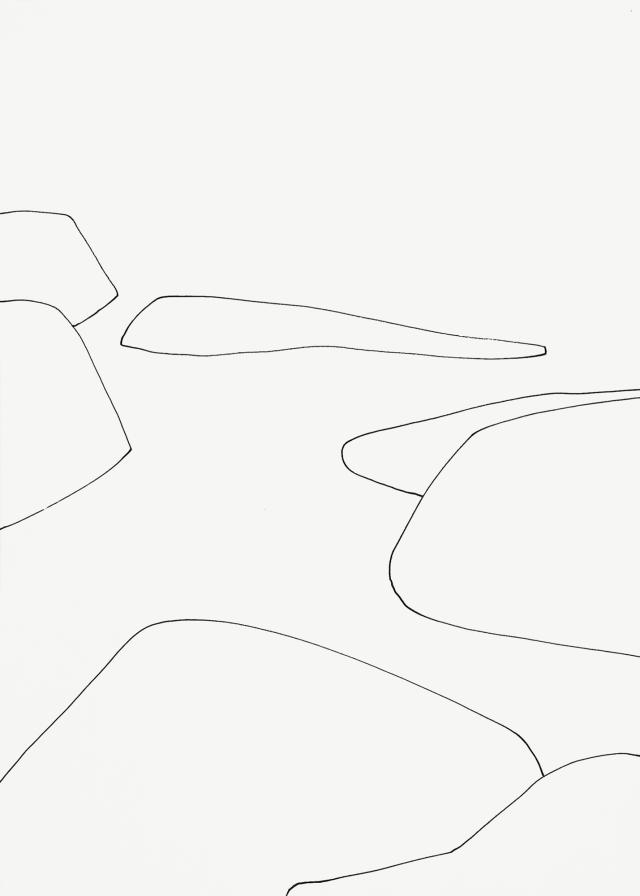“My drawings rarely have a symbolic meaning. They’re all about what is being depicted. Brief sensations, instants, a slightly prolonged pause over something that we all know but pay little attention to.”
Silvia Bächli restricts her vocabulary to the use of black on white paper. In this way she limits potential choices that would otherwise hinder the production of unpremeditated forms. Working in charcoal, gouache, ballpoint or Indian ink, she does her drawings freehand to encourage the intuitive creation of images. The open signs that take shape may be abstract or figurative, like preverbal formulations or music notes whose lines conjure up a visible world (be it anthropomorphic, geological or floral) as much as a mental structure.
Once they have been selected, the drawings are brought together and organised in a carefully thought out manner. “How I place my drawings forms the third step in the work process… I try to arrange them according to the connections they may have amongst themselves. Each of them is a sound. Each tonality has a certain intensity, colour, attitude, extension, clarity, particular weight. The pauses and intermediary spaces have exactly the same importance. Each drawing deploys a space around itself that is peculiar to it – a force field. A drawing has to find the right distance between two others. They are friends, relatives, associates, deadly boring sales reps, pairs of lovers, twins, lazy idlers, loners. Each drawing stands as a reference point in a network of connections. There is no centre in this network. I try to find a disturbing balance in these spaces.”
Through her wall installations – which she has been devising since the 1980s – Bächli creates groups of inseparable works, as she has done here. It was only after visiting the Pictet Bank and choosing the locations for her drawings that she elaborated her selection. She then hung the work personally. “The drawings are like pieces of sculpture and project themselves to a range of distances in the space we are in. The white walls and the very space are an integral part of the pictorial field.” Observing how Bächli’s works are assembled, one discovers the meaning of a detail, the taste for the moment, the question of a presence or a vision, as well as the thickness of a line and its path, the intensity of the black and the brightness of the paper. It is a white that resonates with the snow of her photographs of Canadian landscapes that have been made a part of the ensemble of works.
Silvia Bächli restricts her vocabulary to the use of black on white paper. In this way she limits potential choices that would otherwise hinder the production of unpremeditated forms. Working in charcoal, gouache, ballpoint or Indian ink, she does her drawings freehand to encourage the intuitive creation of images. The open signs that take shape may be abstract or figurative, like preverbal formulations or music notes whose lines conjure up a visible world (be it anthropomorphic, geological or floral) as much as a mental structure.
Once they have been selected, the drawings are brought together and organised in a carefully thought out manner. “How I place my drawings forms the third step in the work process… I try to arrange them according to the connections they may have amongst themselves. Each of them is a sound. Each tonality has a certain intensity, colour, attitude, extension, clarity, particular weight. The pauses and intermediary spaces have exactly the same importance. Each drawing deploys a space around itself that is peculiar to it – a force field. A drawing has to find the right distance between two others. They are friends, relatives, associates, deadly boring sales reps, pairs of lovers, twins, lazy idlers, loners. Each drawing stands as a reference point in a network of connections. There is no centre in this network. I try to find a disturbing balance in these spaces.”
Through her wall installations – which she has been devising since the 1980s – Bächli creates groups of inseparable works, as she has done here. It was only after visiting the Pictet Bank and choosing the locations for her drawings that she elaborated her selection. She then hung the work personally. “The drawings are like pieces of sculpture and project themselves to a range of distances in the space we are in. The white walls and the very space are an integral part of the pictorial field.” Observing how Bächli’s works are assembled, one discovers the meaning of a detail, the taste for the moment, the question of a presence or a vision, as well as the thickness of a line and its path, the intensity of the black and the brightness of the paper. It is a white that resonates with the snow of her photographs of Canadian landscapes that have been made a part of the ensemble of works.
